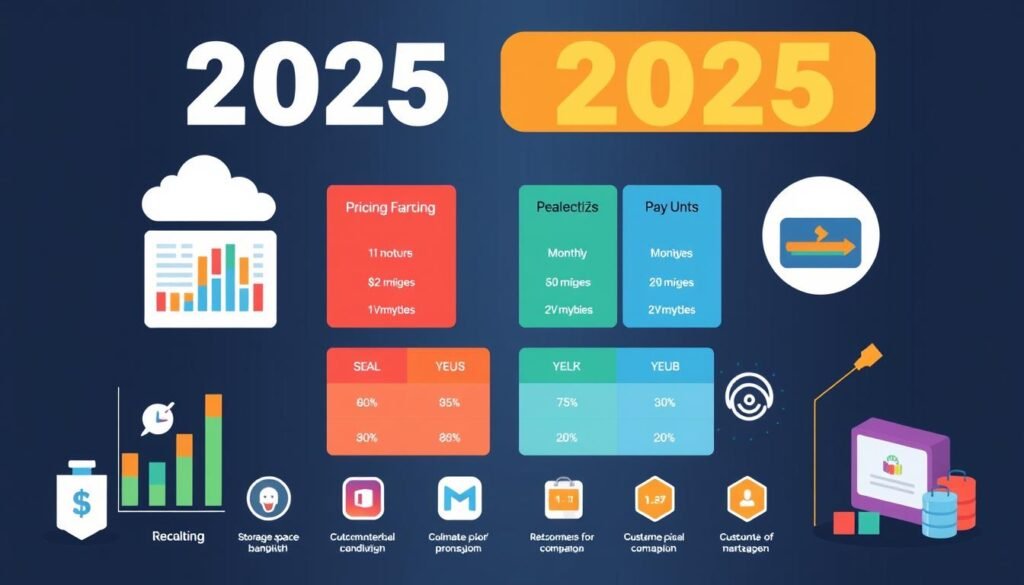The success of your e-commerce business depends on your web hosting. It must be reliable, perform well, and keep your site safe. But with many choices, finding the right one can be tough. It’s important to know what e-commerce hosting needs and find top providers.
If you’re an entrepreneur or small business owner, you might wonder: What makes e-commerce hosting special, and how do I pick the best for my online store? This guide will explore e-commerce hosting deeply. We’ll look at key features, top providers, and important things to consider for your online business’s success.
Key Takeaways
- E-commerce hosting needs special features like SSL certificates, PCI DSS compliance, and strong security to protect data and transactions.
- Good uptime, network performance, and scalability are key for a smooth shopping experience and growing your business.
- Great customer support and easy control panels are vital for e-commerce entrepreneurs who may not know a lot about tech.
- Finding a web hosting that’s affordable but offers good features and functionality is important for your e-commerce needs.
- Being compatible with popular e-commerce platforms and shopping cart solutions makes managing your online store easier.
Understanding E-commerce Web Hosting Fundamentals
Choosing the right web hosting is key for a successful online store. Reliable hosting for online stores means more than just a place to host your site. It’s about top-notch performance, security, and the ability to grow with your business. High-performance e-commerce hosting is vital for a smooth shopping experience and your store’s growth.
What Makes E-commerce Hosting Different
E-commerce hosting is different from regular web hosting. Small websites might do okay with shared hosting, but e-commerce sites need more. They handle secure payments, manage stock, and deal with lots of visitors during sales. Scalable hosting for online shops lets your site grow with demand without slowing down.
Core Components of E-commerce Hosting
Good e-commerce hosting includes secure payment options, advanced stock management, and fast servers. These elements work together to give your customers a safe and quick shopping experience.
Infrastructure Requirements
The hosting setup for e-commerce sites must focus on security, speed, and growth. It needs strong security like SSL certificates and firewalls to keep customer data safe. Content delivery networks (CDNs) and caching help pages load fast, making shopping better for everyone.
“Investing in the right e-commerce hosting solution can make all the difference in the success of your online store.”
Key Features to Look for in E-commerce Hosting Solutions
When searching for the best managed e-commerce hosting services or affordable web hosting for e-commerce sites, there are key features to consider. A good business website hosting solution can greatly impact your online store’s success.
SSL (Secure Sockets Layer) certification is a must. It encrypts customer data, like payment info, and meets PCI DSS standards. Choose hosts that offer free, automated SSL certificates for easy setup.
- PCI DSS compliance is key for secure online payments and customer data protection.
- Automatic backups are essential for quick website and data recovery in case of failures or attacks.
- 24/7 customer support is critical, as e-commerce sites need help anytime.
It’s important to integrate your e-commerce platform with your hosting. Many top hosts make this easy with one-click installations of popular software like WooCommerce or Magento.
| Feature | Importance |
|---|---|
| SSL Certificates | Essential for securing customer data and enabling PCI DSS compliance |
| Automatic Backups | Crucial for data protection and easy website restoration |
| 24/7 Customer Support | Vital for resolving issues and maintaining business operations |
| E-commerce Platform Integration | Streamlines the setup and management of your online store |
When choosing managed e-commerce hosting services or affordable web hosting for e-commerce sites, look for advanced security and performance tools. Also, ensure the host can grow with your business.
Best Web Hosting for E-commerce: Top Providers Compared
Finding the right web hosting is key for your e-commerce success. The market has many options, from premium to budget-friendly. Let’s look at the top providers and what they offer.
Premium Hosting Solutions
Premium hosting like WP Engine and Kinsta is top-notch. They offer high-performance WordPress hosting with advanced features. This makes them great for e-commerce sites on WordPress.
With their strong infrastructure and support, these options help your online store grow. They ensure your Hostinger website hosting and growing your business run smoothly.
Mid-Range Options
Bluehost and SiteGround offer a good mix of features and price. They have tools and resources for e-commerce entrepreneurs. Their easy-to-use interfaces and reliable performance make them solid choices for your online store.
Budget-Friendly Choices
Hostinger and Namecheap are great for those on a budget. They offer Hostinger website hosting and website hosting for businesses at lower prices. While they may lack some advanced features, they provide the basics for getting online and growing your business.
Hostinger is a standout for its affordability and high-performance features. It’s a popular choice for smaller e-commerce sites.
| Provider | Pricing | Uptime | Storage | Key Features |
|---|---|---|---|---|
| Bluehost | $6.99 – $12.95/month | 99.98% | 40GB – 100GB SSD | Free SSL, daily backups, 24/7 support |
| Hostinger | $4.49 – $9.99/month | 99.9% | 200GB SSD | Free migration, international data centers, performance tools |
| SiteGround | $49.99/month | 99.98% | 10GB – 40GB SSD | 400,000 monthly visits, advanced security suite |
Choosing the right web hosting for your e-commerce business is important. Consider your needs, budget, and growth goals. By exploring these options, you can find the perfect Hostinger website hosting solution for your online success.
Security and Performance Considerations
When choosing affordable web hosting for your website builder and online presence, security and performance are key. E-commerce sites need strong security to protect customer data and transactions.
Secure Socket Layer (SSL) certificates are essential. They encrypt data between the user and server. Look for hosting plans with free SSL certificates and regular malware scans to keep your site safe from cyber threats.
For e-commerce sites, performance is just as important. Slow loading times and downtime can upset customers and cost sales. Choose a hosting provider with fast server response times, high uptime (ideally 99.9% or better), and CDN integration for better global access and faster page loads.
| Security Features | Performance Metrics |
|---|---|
|
|
Choosing a web hosting provider that focuses on security and performance is smart. It keeps your e-commerce site safe, reliable, and ready for success.
“Milliseconds Make Millions – A Deloitte study found that a 0.1-second change in a site’s mobile speed load time results in customers engaging more and spending almost 10% more.”
Scalability and Resource Management
As your e-commerce website grows, it’s key to handle more traffic and scale resources smoothly. Picking website hosting with strong scalability features is vital for your online business to succeed.
Traffic Handling Capabilities
E-commerce sites see different traffic levels, like during big shopping times or special events. Find hosting that lets you adjust CPU, RAM, and storage easily. This way, your site won’t slow down when traffic goes up.
Storage and Bandwidth Options
As your products and customers grow, your hosting needs to too. Look for hosting that can grow with you, without slowing down. This keeps your site fast and efficient.
Upgrade Paths
Go for a hosting provider that makes it easy to move up to more powerful options. This could be from shared hosting to VPS or dedicated servers. This flexibility helps your site grow without any hiccups.
| Hosting Provider | Traffic Handling Capabilities | Storage and Bandwidth Options | Upgrade Paths |
|---|---|---|---|
| Nexcess | Flexible resource allocation, auto-scaling | Scalable storage and bandwidth plans | Seamless transition from shared to VPS, dedicated servers |
| Hostinger | Load balancing, resource monitoring | Tiered storage and bandwidth plans | Upgrade from shared to cloud, VPS, or dedicated hosting |
| Elementor Ecommerce Hosting | Autoscaling, content delivery network (CDN) | Scalable cloud-based storage and bandwidth | Easily scale resources as needed |
Choosing the right e-commerce website hosting is key. It lets your business grow and meet changing demands. This ensures a smooth experience for your customers, even when traffic is high.
Pricing Structures and Value Analysis
Finding the best web hosting for your ecommerce business is key. Look at the pricing structure and value offered. It’s not just the upfront cost but the long-term benefits and features. By checking ecommerce website pricing and value, you can find a hosting solution that meets your needs. It should include domain registration, web hosting features, website performance, and customer support to help your ecommerce succeed.
Look at what’s included, like free domain registration, email accounts, and SSL certificates. These extras can add a lot of value to your hosting plan. They can save you money and make setting up your website easier. Also, watch out for introductory rates that might change later. Unexpected price hikes can affect your budget.
| Hosting Plan | Introductory Rate | Standard Rate | Included Features |
|---|---|---|---|
| Shared Hosting | $3.95/month | $7.99/month | 1 domain, 10 GB storage, 100 GB bandwidth |
| VPS Hosting | $19.95/month | $29.95/month | 2 vCPUs, 4 GB RAM, 50 GB SSD storage, 2 TB bandwidth |
| Dedicated Server | $99.95/month | $149.95/month | 4 cores, 8 GB RAM, 500 GB SSD storage, 5 TB bandwidth |
Compare hosting plans based on what they offer, not just the price. This way, you can choose a plan that fits your ecommerce business’s needs. Look for hosting that offers great value and flexibility to grow your online presence.

“Investing in the right ecommerce hosting solution can be a game-changer for your online business, providing the stability, scalability, and customer support needed to thrive in the dynamic digital landscape.”
E-commerce Platform Compatibility
Choosing the right web hosting for your e-commerce site is key. Make sure it works well with your e-commerce platform. This ensures a smooth shopping experience for your customers.
WordPress Integration
For WordPress users, look for hosts that offer optimized WordPress environments. They should also have great WooCommerce support. These hosts provide features like one-click store creation and 24/7 support to boost your WordPress e-commerce site.
Shopping Cart Solutions
Look for hosts that support popular e-commerce platforms like Magento and Shopify. They should offer customizable themes and secure checkout options. This meets the needs of your online store.
Custom Platform Support
If you use a unique e-commerce solution, make sure your host supports it. This ensures you can use all your system’s features without any issues. It also keeps your website running smoothly.
| Web Hosting Provider | E-commerce Platform Compatibility | Pricing |
|---|---|---|
| Bluehost | WordPress, WooCommerce | $6.99 per month (usually $15.99/mo.) |
| Hostinger | Magento, Shopify, Custom Platforms | $3.59 per month (+3 months free) |
| SiteGround | WordPress, WooCommerce, Custom Platforms | $2.99 per month |
| BigCommerce | BigCommerce Platform | $29 per month |
| WP Engine | WordPress, WooCommerce | $20 per month (usually $30/mo.) |
| Shopify | Shopify Platform | $29 per month |
| HostGator | Magento, Shopify, Custom Platforms | $2.52 per month |
| Liquid Web | Custom Platforms | $20 per month |
By checking the e-commerce platform compatibility of your host, you ensure a smooth shopping experience. This drives positive reviews and boosts your website’s performance.
Customer Support and Technical Assistance
When you ask What is Hostinger website hosting? and How can Hostinger help businesses get online?, you need reliable support. Good hosting providers offer 24/7 help through live chat, phone, and email. They also help with setting up and optimizing your e-commerce site.
It’s also important to have self-help tools. Look for hosts with detailed knowledge bases, tutorials, and active forums. These tools help you solve problems on your own and keep up with new updates.
- Comprehensive 24/7 support channels (live chat, phone, email)
- Specialized e-commerce support for platform setup and optimization
- Extensive knowledge base, tutorials, and community forums for self-help
The quality of customer support is key to your success. Choose hosts that offer top-notch technical help and a great customer experience.

Speed Optimization and Content Delivery
Fast loading speeds are key for e-commerce success. Look for web hosts with speed-optimized servers, SSD storage, and servers near your audience. Content Delivery Networks (CDNs) help speed up content delivery worldwide, making your site faster and better for users.
Advanced caching solutions, like server-side and browser caching, boost site speed. They store often-used content locally and pre-load info. This cuts down HTTP requests, making your site load faster, even on slow internet. What are the benefits of using Hostinger for business websites?
Choosing the right web hosting plan is important for speed. Look for plans with enough RAM, SSD storage, and customizable servers. How do you choose the right web hosting plan? Pick a host that offers strong speed optimization to give your customers a smooth shopping experience.
